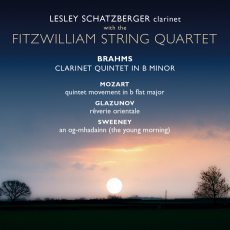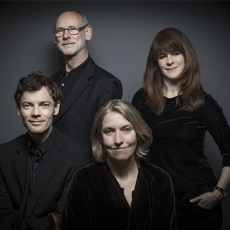Brahms - Lesley Schatzberger and the Fitzwilliams - IRR
The opening bars of this new recording of the Brahms Clarinet Quintet are a revelation. The clarinet emerges from the string texture with a haunting, veiled quality that seems exactly right. As we discover from the booklet notes, it's just that, as Lesley Schatzberger is playing a copy of the instrument used by Richard Mühlfeld, the player who inspired Brahms's Clarinet Trio and Sonatas as well as the glorious Quintet. As the movement goes on we hear the remarkable range of colours that this clarinet can produce - from dusky, whispered half-tones to a brilliant and strident forte. It's the quiet playing that is truly lovely here. The Fitzwilliam Quartet use gut strings and a playing style that employs vibrato for real expressive enhancements of phrases rather than as a default setting, and there is occasional use of subtle portamento, especially by the leader Lucy Russell. All of this follows the evidence that survives of Joachim and his disciples, and it draws most productively on the important research by the scholar Robert Pascall on Brahms performance practice.
The historically informed thinking behind this recording of the Brahms has resulted in a vibrant and emotionally involving account of the work that is enormously welcome from a purely musical point of view as well - these players are utterly at home with the style, and the result is one of the most rewarding discs of this much-played work to have appeared in recent years, with a range of colours that is ear-opening and often ravishing - from strings as well as clarinet. The ‘modern'-instrument versions I listen to most often are more than half a century old - Alfred Boskovsky's wonderfully unforced and autumnal stereo recording with members of the Vienna Octet on Decca or the earlier mono version from the same soloist and ensemble on Testament. For a modern version using a copy of the clarinet Brahms had in mind when he wrote the work, and string players steeped in the style of the period, look no further than this new version.
The couplings here are enterprising and offer more reasons to explore this disc. They also provide an opportunity to hear Schatzberger using other clarinets. Mozart's movement for clarinet and strings K.516c/KAnh91 (not ‘K.516' as stated in the booklet - that's the G minor String Quartet) is an attractive fragment that has been convincingly completed by Duncan Druce. Glazunov's Rêverie orientale is a lovely piece - Full of Eastern promise, apart from a couple of moments in the middle which, amazingly, have a hint of early Vaughan Williams about them. It's a seductive work this - I found myself wanting to play it again straight after listening to this impassioned performance. Finally, William Sweeney's An Óg-Mhadainn (‘The Young Morning'), originally written for Schatzberger's teacher Alan Hacker, is scored for basset-clarinet and strings. The soloist muses freely over a string background and the effect is rather haunting.
The notes, by violist Alan George and others, are informative and entertaining, and Linn's recorded sound is superbly realistic and natural. Recommended.


